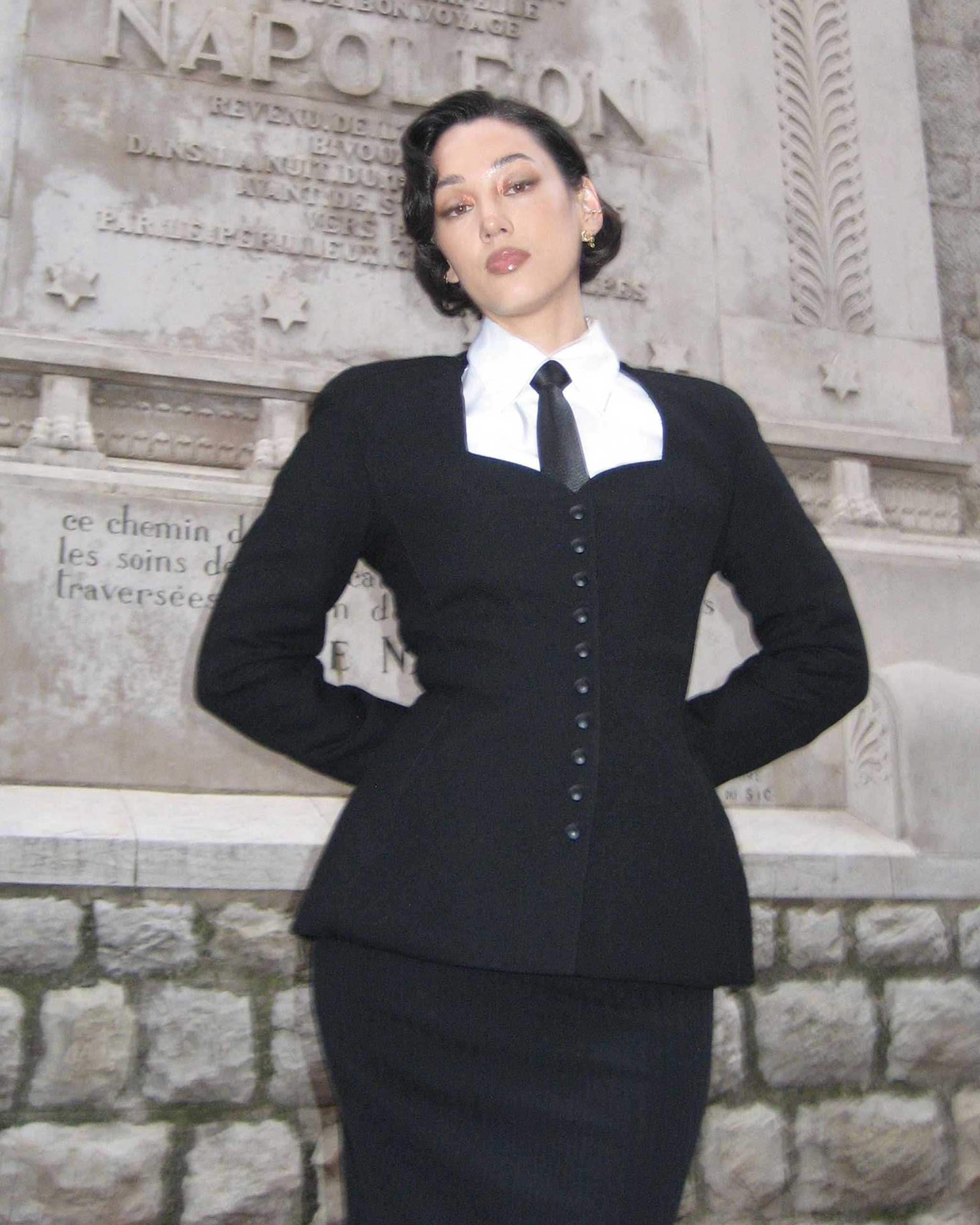Vintage MUGLER blazer by Thierry Mugler, vintage DOLCE & GABBANA shirt and skirt, WOLFORD tights, BALENCIAGA shoes, and CELINE bag. Photo courtesy of Kim Jones
After a whirlwind run through the screenings at this year’s Cannes Film Festival, multidisciplinary creative, filmmaker, and producer Kim Jones sits down with Vogue Philippines to recount her very first Cannes experience and what it was like being present at a great season for Philippine cinema.
KIM JONES: It was my first time at Cannes, which was, needless to say, a monumental moment for me. Film has been a part of my life for a long, long time now, but I hadn’t yet been brave enough to make the full pivot and make it my sole direction. But over the last couple of years, I’ve been kind of transitioning and working on smaller-scale projects, but Cannes felt like a bookend to me, kind of like a closing of one chapter and the opening of another. So, on a personal level—and anyone else who’s dreamed of making a transition to a new career will understand what I’m talking about—this felt really, really special, and honestly in the best way possible. It was the best way possible to start this new journey.
On what brings her to the Cannes Film Festival this year
I was there thanks to producers Bianca Balbuena and Bradley Liew. They have opened a lot of doors for a multitude of filmmakers and the stories that they champion. Their own trajectories and their own careers have been very inspiring. And getting to see, you know, what they’ve mounted in terms of the Directors’ Factory, which is the first time it’s been held in the Philippines and only the second time since its conception that it’s been held in Southeast Asia, and seeing the fruits of their labor with the film in certain regard, which is Viet and Nam (2024), has been such a joy.
I really wanted to see what the current landscape was within the film industry, see what voices were being amplified, see what stories were being told, understand, you know, just what material was available, and see how I could come on board. I love producing. It’s definitely a part of filmmaking that I really enjoy, and funnily enough, I can pull a lot of my skill set from the fashion world into the production world. I’m working on my own feature film story, and being able to reconnect with producers and everyone I’m working with in the Cannes setting was honestly a dream come true. I was really just there to learn and kind of imbibe the surroundings and just see the best filmmakers in the world come together and talk about film, talk about the projects that we’re working on. Obviously, there were a lot of networking opportunities. There was a lot of fun to be had.
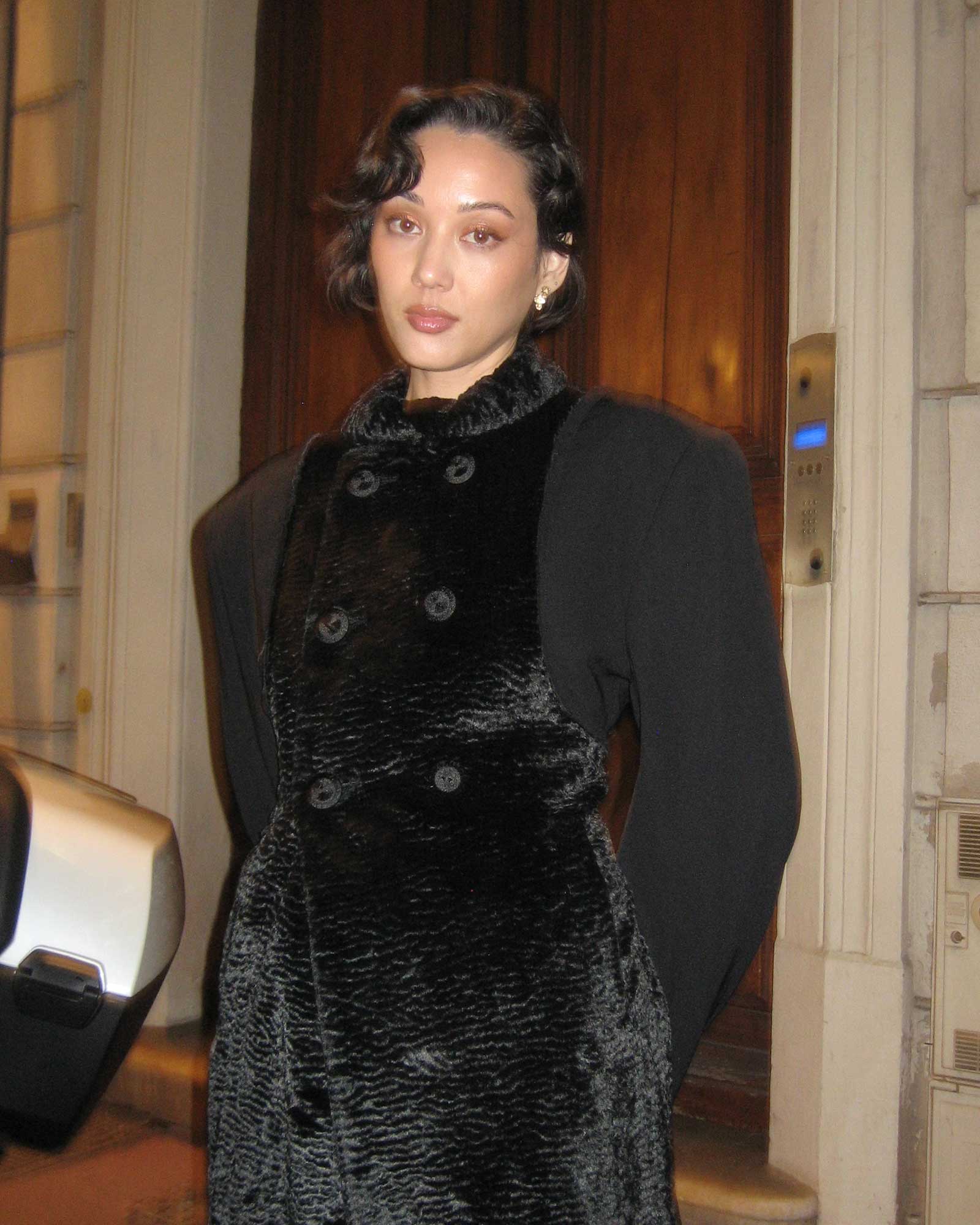
And also, you know, waking up early to get screenings and running from screening to screening felt very synonymous with my experience in the fashion world of running from show to show. So obviously, it was like a lot of fun to get caught up in the whirlwind of the glitz and the glamor as well.
But you know, when the sun shines and you’re on your way to the next film screening, and you’re not sure what this particular film has in store for you—it felt very magical, felt like another universe and another world, and also just kind of seeing Bianca and Bradley navigate the industry and navigate their network and reconnect with everyone, and seeing how they approach this and how these incredible minds are bringing Filipino stories and Filipino productions and merging them with other Southeast Asian minds and voices was really a sight to behold, and I think it’s props to them for everything that they’re doing and how important it is for filmmakers like me to see that and to learn from them.
On her first Cannes Film Festival badge
When I received the Cannes badge, it was very surreal. I didn’t know what to expect. I really just wanted to go to Cannes to pick up as much as possible, learn as much about production and the industry, [and] really just immerse myself in this world that I love and I had no expectations other than just to kind of again, you know, be an observer and learn as much as I could.
I will never, ever forget that badge. I cherished every moment it was with me. And, you know, obviously, the dream is to have a film at Cannes, and I think it will be relegated to be used as a manifestation tool at this moment, so I’m very grateful for that. I learned a lot from Bianca and from Brad and seeing how they navigate these festivals, especially having their own film, Viet and Nam, and having the world premiere there as well, and seeing how getting to chat with the directors and the actors was just such an incredible, rewarding, and enriching experience.
“We’re all there just because we love cinema in one way or the other. Yes, there are the fun parts of the glitz and glam, but ultimately, I think you’re there because you just share this inherent, profound love of story.”
On a typical day in Cannes
A typical day for me was waking up early, having a coffee—a lot of coffee—and kind of planning out the schedule for the day. The best part about having a badge is that you also get to go and attend panels and speaking engagements, and there’s a lot of really kind of forward-thinking ideas and studies, or explorations on kind of where the industry is moving towards, especially with the integration of AI across the board in storytelling and acting in post-production and editing and sound and everything. And I really wanted to soak in as much as possible, being there and getting to talk to people who are really leading the charge in that way.
But also, I was able to see Cate Blanchett and listening to her talk about displacement and its place and importance in cinema and storytelling—listening to her speak about the responsibility and the necessary inclusion and authenticity in storytelling—was galvanizing and almost sobering, in a way. Because you just realize that there are so many stories to be told and so many voices that don’t have an avenue yet. It definitely has given me a greater perspective on what stories I want to work on, and what projects I want to work on.
So I would attend those [kinds of talks], and then we’d meet up with Bianca and Brad and other producers and other incredible Filipino filmmakers, and we’d go out to a variety of different events, cocktails, networking, dinners, everything. I would have other meetings—meet up with friends. And it was [always a] jam-packed day, and I think I would end the day sometimes around 3 AM and then I would put my hair in rollers, and I would sleep in rollers, and then wake up at 6 or 7 AM to start the day again and smash down a coffee and catch a screening.
On her Cannes style
When I found out I was going to Cannes, I really wanted to have fun. I haven’t been to Fashion Week in a while, and I love styling looks based on what energy I need for whatever I’m working on. So I had been collecting these pieces for a while, and I thought it would be the perfect opportunity to take them out of their dark closet and bring them into the light at Cannes.
I found this ‘95 John Galliano suit with this incredible hourglass shape and shoulder pads. It’s a runway piece. So, I wanted to borrow, I think, from the power of power-dressing and use it to inject a little confidence into me, given that I wasn’t sure what Cannes had in store for me.
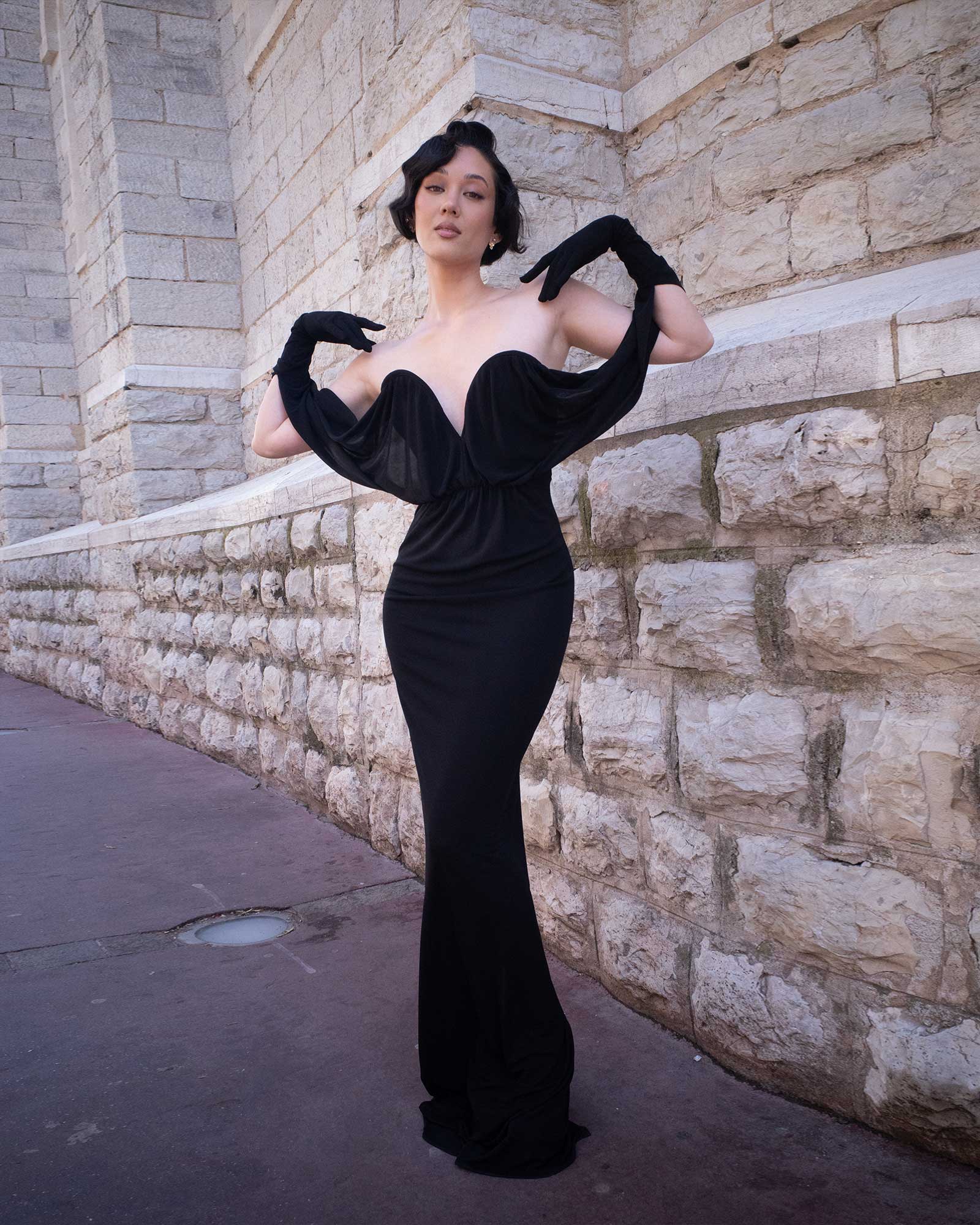
So I kind of pulled out these old Mugler pieces that I’d had for a while, in like these bold reds. And I wanted pinstripes and ties and suiting with a little peak of lace. had this Comme des Garçons peacoat from ‘93 that Kate Moss wore on the runway. Again, I kind of borrowed the power from the clothes to boost my confidence and to just make me feel a little bit more empowered. I would just put my hair in rollers. I wanted to have fun with kind of like the 50s, as an ode to the 50s Hollywood, Old Hollywood era. I watch a lot of Hitchcock. I watch a lot of Marilyn Monroe, and I love the costume element of those films. One of my favorite Hitchcock films is To Catch A Thief (1955) with Cary Grant and Grace Kelly. I just adore that film, and it just only felt fitting. You know, it is set in the French Riviera, and I was going to the French Riviera, [so] I kind of used those cues to have fun with my own dressing. And, yeah, I loved it. I had a ball, and it was a lot of fun.
On her favorite sights along the Croisette
We stayed about a three-minute walk from the Palais [The Palais des Festivals et des Congrès, the festival’s primary venue], and that was intentional. I really wanted to be as close as possible to the screenings and to the film markets because I knew I would be going back and forth, running around. I wanted to watch as much cinema as I possibly could in between all of the other things I wanted to do.
I just loved the energy. It’s an electric energy for sure, both inside the venues and in meetings and in the restaurants that you walk past but also the lines out the front and the crowds that come to support their favorite filmmakers.
I think one of my favorite things to see was people would dress up and request tickets, because in order to get to the screenings, a lot of them have dress codes. So people would come and hold signs to the movie that they were requesting a ticket for because tickets were transferable. Sometimes, very happily, these people would score last minute to get to the film they wanted to see. And why was it my favorite thing that I saw? I think it’s just proof that cinema is unifying in that sense. You know, we’re all there just because we love cinema in one way or the other. Yes, there are the fun parts of the glitz and glam, but ultimately, you know, I think you’re there because you just share this inherent, profound love of story. And I really enjoyed just walking past the endless lines of people who all kind of have their own itinerary for the day or their own intention. But the air was thick with a love for film.
“It’s incredible watching what people will fight for in order to use film as a vessel for these stories.”
On her favorite memories from the festival
My favorite memory from being at Cannes, honestly, is so simple. It was just being in a dark room with a full cinema. Nobody’s on their phones. You know, it’s so special to be in a cinema that’s packed full of people. Getting to watch the premiere with the directors is incredible. Getting to watch it with the actors is incredible. And when the logo appears on the screen with this like, beautiful Harry Potter-esque music alongside it gives me chills every time. It was just such a surreal moment when that logo came on and you just don’t know what the film has in store for you, and you’re just excited.
I think also the screenings had a really strong impact on me, because at the end of the film, obviously there’s the applause and the standing ovations, and you turn behind you and the filmmaker, the director, Kevin Costner [of Horizon: An American Saga] is getting emotional because everybody in that room knows how hard it is to make a movie. It’s a miracle it ever even gets made, so to be celebrated and recognized, I can only imagine how significant these moments are, even for someone later in their career.
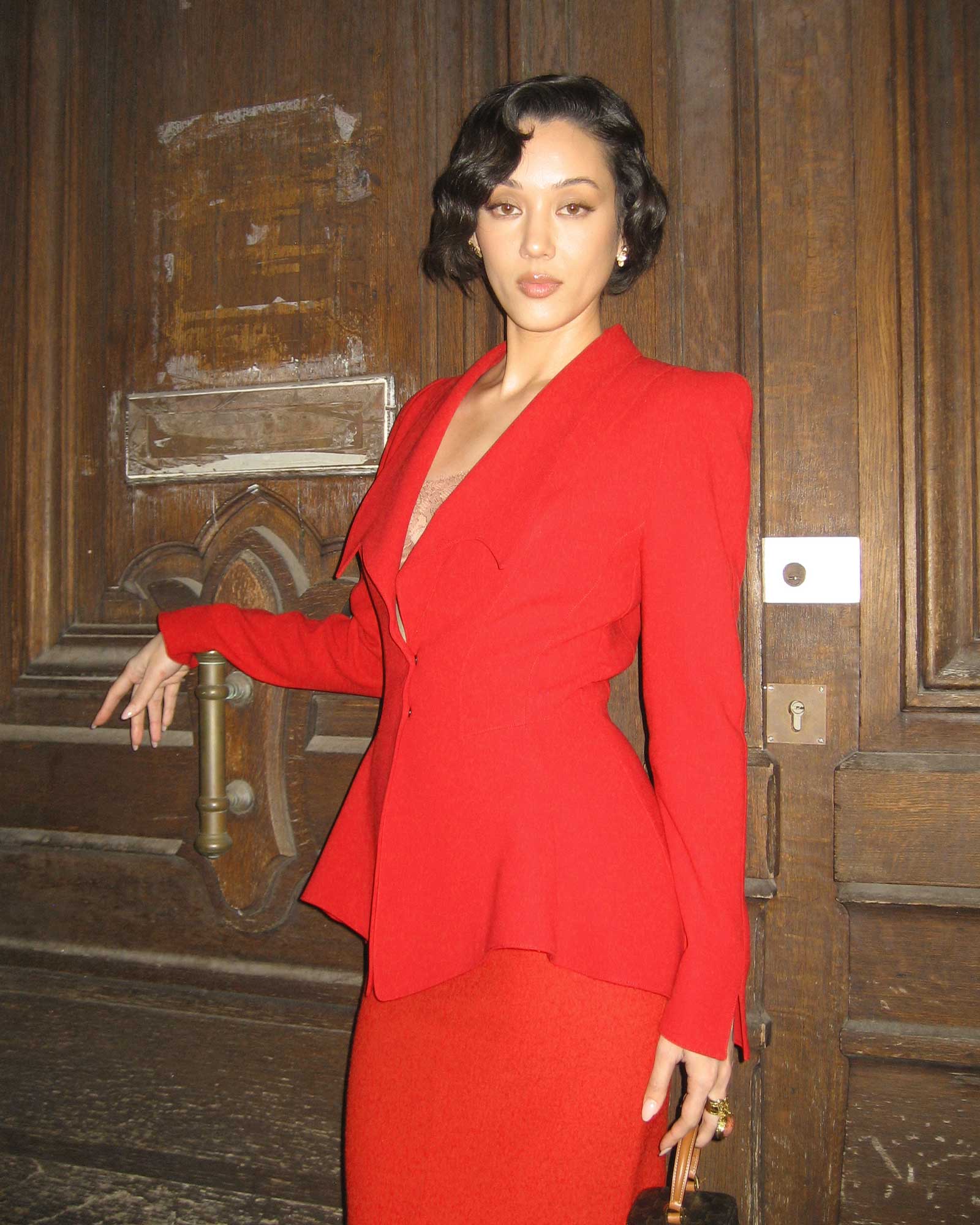
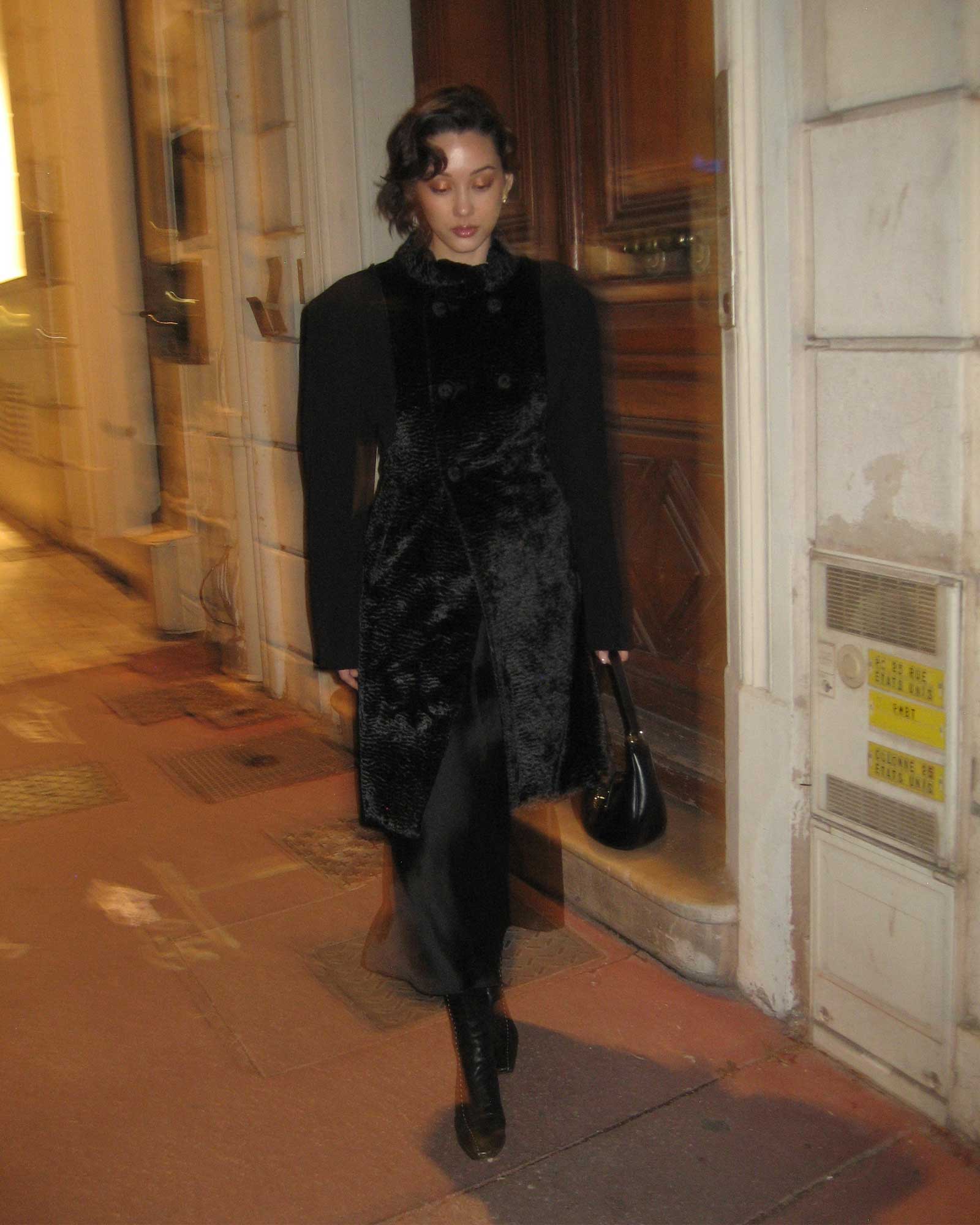
It was such a joy to watch people just enjoy the celebration of what they’d made and what they’d accomplished. It got me a little bit teary-eyed, and a little bit emotional because, again, when it’s something that you love and it gets made and you pour your heart and soul out, it’s quite special. And so, yeah, the dream is to one day have a film at Cannes again.
I think also that Cannes is this great kind of unifier with age as well. I remember being in this, I think it was the screening of Kinds of Kindness [dir. Yorgos Lanthimos], and there was a young boy in front of me. He couldn’t have been more than 12, dressed in a tux, and then I turned to my side, and there was some more mature lady, perhaps in her 80s. And just seeing the diverse ages of the audience was just so enjoyable as well. And I remember it feeling diverse in terms of who was watching the movie.
On the film screenings she attended
I went to Kinds of Kindness by Yorgos Lanthimos, which I am so excited. Like I was so thrilled to have gotten to see that premiere, and I saw Kevin Costner’s Horizon, The Substance [dir. Carolie Fargeat], and The Balconettes [dir. Noémie Merlant], and many others. I really, really loved The Substance and The Balconettes because they were from such distinctive, unique women, and they were very intentional with using body horror as a vessel for a study on the impact of society’s expectations of women and society, standards of beauty, and how they used that in kind of like this feminist-horror sense. It was really enjoyable to watch.
I think that’s what was so special, really that these films made me feel seen. And that’s all I think a filmmaker dreams of doing, is having some emotional tether to the work and to the story. And it was so nuanced. That’s what’s so powerful about women filmmakers—it’s in the nuance, it’s in the detail, it’s in the subtleties. I think that really holds the glue of the story together, and that’s what makes me feel seen. It’s not in the plot. It’s not in how maybe the women characters are but it’s in how she washes her hair, it’s what it feels like to go braless in a day. It’s all of these tiny subtleties, I think, that I really, really enjoyed in those films.
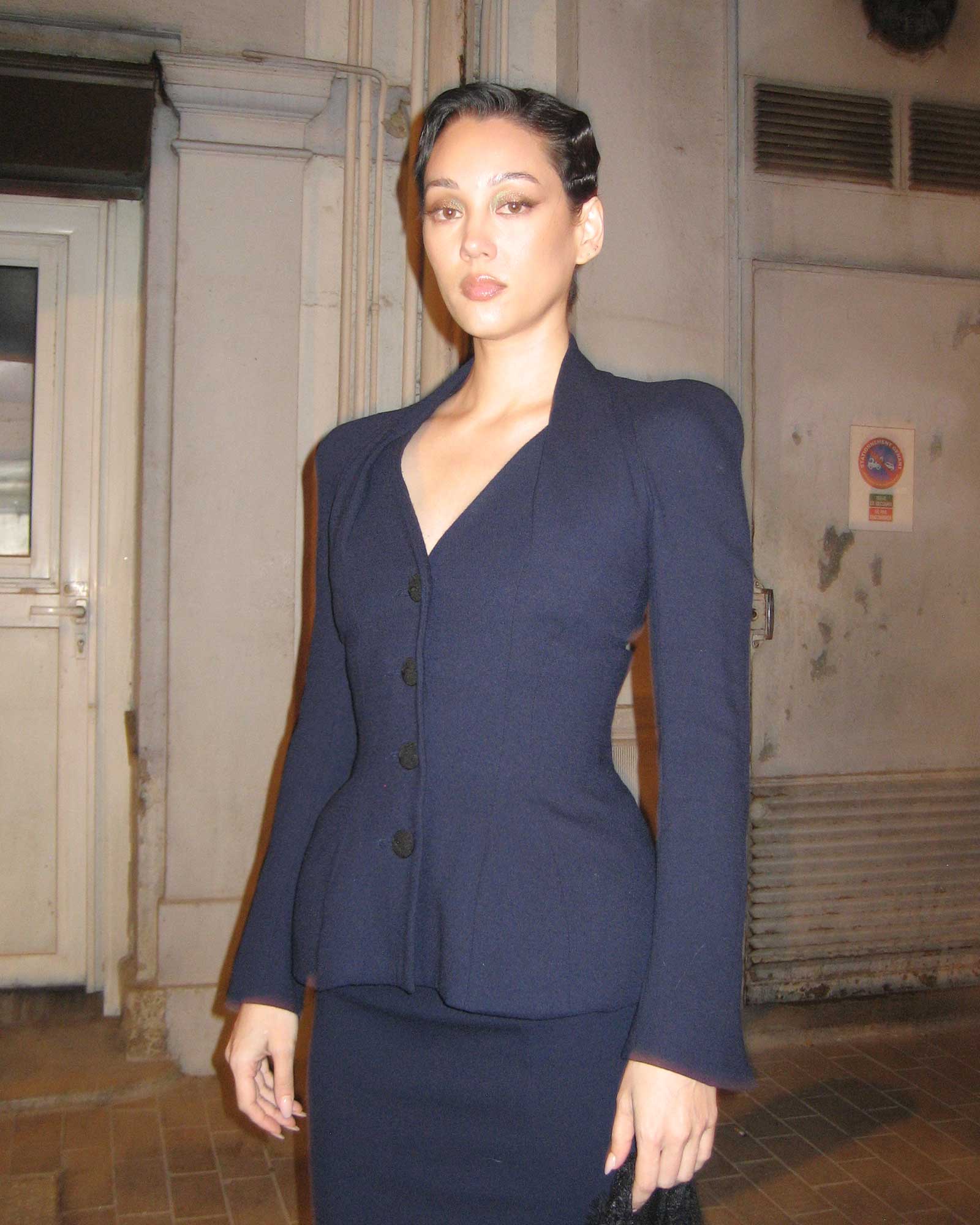
On how this year’s Cannes Film Festival was a great run for women in cinema and Philippine cinema
It was really a wonderful season for women in cinema and Philippine cinema. I met such a vast array of voices in cinema—from directors to producers to sound designers to young filmmakers and women filmmakers—and listened to the stories that they want to tell: This incredible kaleidoscope of stories, all that these individual directors know so intimately. They know their stories so incredibly deeply and intimately. It’s so hard not to fall in love with the stories that they want to tell, and especially watching the Directors’ Factory and getting to attend the pitch session of those directors and seeing how they plan to tell their future stories, you know, in feature form. Again, it’s very electrifying and galvanizing.
I really attended Cannes to see what stories were being told or wanted to be told, how I could fit in that space, where I could come on board, and what I could offer to filmmakers. It’s just so special that the worlds that these people build and the characters that these people are sharing, especially for women in cinema, have such a unique perspective.
I think of the two women directors who were part of the Directors’ Factory. So I think of Maria Estela Paiso and Eve Baswel. I enjoyed their pitches so much. I enjoyed their heart and how much of these stories are formed from their identity, from their culture, from our culture, from their values, from their beliefs. All of that woven together just creates such a unique perspective. And I think I’m so excited to see what they do, and it’s incredibly inspiring. And I just want to be a part of it all.
On how this season inspired her as a filmmaker and producer
How did this season inspire me? Profoundly. It inspired me profoundly. I have started producing films, working with filmmakers like Gaby Serrano and her sister Sam. I’m working with Paco Raterta and producer Gale Osorio of Archipelago.
[Cannes] was enlightening. I don’t want to, perhaps, over-romanticize the experience because, you know, the lights—the glamorous and glitzy lights—are blinding oftentimes. Yeah, it was just so enlightening to see and hear from the voices and hear how they arrive at the stories they want to tell. So speaking to the filmmakers behind these films and how they arrived at their films, and just the determination of these filmmakers to amplify these voices and stories even if it’s challenging or near impossible. It’s incredible watching what people will fight for in order to use film as a vessel for these stories.
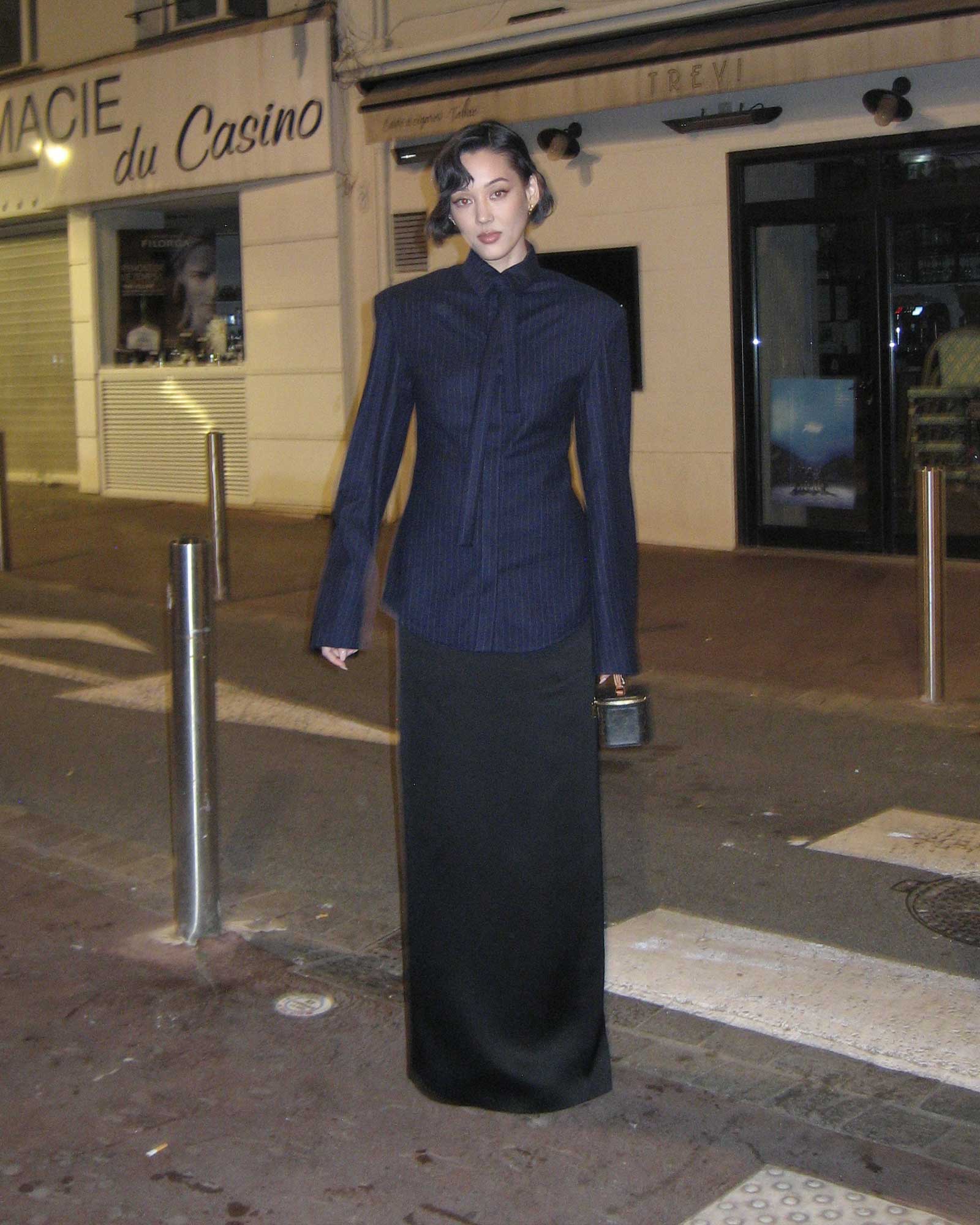
It’s hard not to get emotional. Everybody’s emotional at Cannes because, again, everybody knows how hard it is to have a film made. And I think I opened up my vulnerability as well. Because you can become very emotionally connected to these artists and you get to have these incredibly beautiful, deep conversations with these directors and storytellers who just yearn for a different world, who want to honor these people’s stories, fiction or non-fiction. They want to honor these stories, and they want to create art for posterity’s sake so that it’s not forgotten. And I think what it brought out in me was a certain reverence for the medium. Although, of course, yes, it’s a business; it’s a lot of fun, and there’s lots of joy to be had, but it was quite sobering in a way as well. I guess I felt a responsibility from the filmmakers—that was very contagious. You know, passion is contagious. And I felt that. At this point, I just want every film they mentioned to be made. I guess I’ll leave it at that because, let’s hope, in a few years when these films get made, I will have the pleasure of witnessing them on the big screen and giving them a standing ovation.
It was very, very special, and I’m so grateful to have learned as much as I’ve learned, and to be there and to immerse myself in such a rich and potent, concentrated love of cinema.
